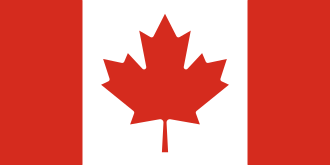Canadians
Canadians (French: [Canadiens / Canadiennes] Error: {{Lang}}: text has italic markup (help)) are people identified with the country of Canada. the connection may be residential, legal, historical, or cultural. For most Canadians, several (or all) of these connections exist and are collectively the source of their being Canadian. Most people who are considered "Canadian" are usually those who have Canadian Citizenship.
 | |
| Total population | |
|---|---|
| Canada: 37,067,011 by the Q2 of 2018[1] | |
| Regions with significant populations | |
| United States | 1,062,640[2] |
| Hong Kong | 300,000[2] |
| United Kingdom | 73,000[2] |
| France | 60,000[3] |
| Lebanon | 45,000[2] |
| United Arab Emirates | 40,000[4] |
| Australia | 27,289[2] |
| China | 19,990[2] |
| Germany | 15,750[5] |
| South Korea | 14,210[2] |
| Japan | 11,016[2] |
| Egypt | 10,000[2] |
| Mexico | 9,816[6] |
| New Zealand | 7,770[2] |
| Philippines | 7,500[2] |
| Haiti | 6,000[2] |
| Switzerland | 5,243[2] |
| Singapore | 5,140[2] |
| Thailand | 5,000[2] |
| Trinidad and Tobago | 5,000[2] |
| Belgium | 4,145[2] |
| Languages | |
| Primarily English and French Numerous indigenous languages are also recognized Various other languages | |
| Religion | |
| Primarily Christian (Protestantism and Catholicism) Various other religions | |
Canada is a bilingual and multicultural society home to people of many different ethnic, religious and national origins, with the majority of the population made up of Old World immigrants and their descendants.
Background
Following the starting period of French and then the much larger British colonization, different waves (or peaks) of immigration and settlement of non-indigenous peoples took place over the course of nearly two centuries and continue today. Elements of Indigenous, French, British, and more recent immigrant customs, languages and religions have combined to form the culture of Canada and thus a Canadian identity.
Canada has also been strongly influenced by its linguistic, geographic and economic neighbour, the United States.
Canadians Media
Map of the Canadian diaspora in the world (might include people with Canadian citizenship and children of Canadians). Canada + 100,000 + 10,000 + 1,000
Monument to Multiculturalism by Francesco Pirelli in Toronto; four identical sculptures are located in Buffalo City, Changchun, Sarajevo, and Sydney
References
- ↑ "CANSIM – 051-0005 – Estimates of population, Canada, provinces and territories". Statistics Canada. 2016. Archived from the original on June 19, 2016. Retrieved January 29, 2017.
- ↑ 2.00 2.01 2.02 2.03 2.04 2.05 2.06 2.07 2.08 2.09 2.10 2.11 2.12 2.13 2.14 2.15 2.16 "Canadians Abroad: Canada's Global Asset" (PDF). Asia Pacific Foundation of Canada. 2011. p. 12. Retrieved September 23, 2013. See also Canadian diaspora
- ↑ Canada
- ↑ "Canada may limit services for dual citizens". Gulf News. January 15, 2014. http://gulfnews.com/news/gulf/uae/visa/canada-may-limit-services-for-dual-citizens-1.1277888. Retrieved July 12, 2015.
- ↑ "Anzahl der Ausländer in Deutschland nach Herkunftsland (Stand: 31. Dezember 2014)".
- ↑ "Población inmigrante residente en México según país de nacimiento, 2015". omi.gob.mx. CONAPO. Archived from the original on November 14, 2020. Retrieved July 18, 2017.
Other websites
- Persons of National Historic Significance in Canada[dead link] - Parks Canada
- Multicultural Canada - Department of Canadian Heritage
- The Canadian Immigrant Experience - Library and Archives Canada
- The Dictionary of Canadian Biography – Library and Archives Canada
- Canadiana: The National Bibliography of Canada – Library and Archives Canada
- Council of European Canadians
- National African Canadian Association Archived 2022-04-04 at the Wayback Machine



